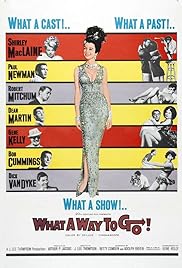WHAT A WAY TO GO!
(director: J. Lee Thompson; screenwriters: from the story by Gwen Davis/Betty Comden/Adolph Green; cinematographer: Leon Shamroy; editor: Marjorie Fowler; music: Nelson Riddle; cast: Shirley MacLaine (Louisa May Foster), Paul Newman (Larry Flint), Robert Mitchum (Rod Anderson), Dean Martin (Leonard Crawley), Gene Kelly (Jerry “Pinky” Benson), Dick Van Dyke (Edgar Hopper), Reginald Gardiner (Painter), Margaret Dumont (Mrs. Foster), Lou Nova (Tentino), Bob Cummings (Dr. Victor Stephanson); Runtime: 111; MPAA Rating: NR; producer: Arthur P. Jacobs; 20th Century Fox; 1964)
“An unappealing episodic black comedy that gets stuck in its own silliness.”
Reviewed by Dennis Schwartz
An unappealing episodic black comedy that gets stuck in its own silliness and flounders on its lame one-note source of comedy–a wealthy four-time widow who finds she’s a jinx, and that money corrupts her married life and prevents her from finding love. The lavish and big-budgeted film (it cost over $20 million) is directed by J. Lee Thompson; screenwriters Betty Comden and Adolph Green based it on the story by Gwen Davis. It’s a star-laden production that substitutes wit for low-brow sight gags and uninspired humor.
To get rid of her cursed money Louisa May Foster (Shirley MacLaine), who is worth $200 million, hands over a multimillion dollar check to the IRS even though she doesn’t owe them any money. They assume she’s mentally ill and send her to see a psychiatrist, Dr. Victor Stephanson (Bob Cummings), who puts her on the couch where she tells her sad life story.
The widow relates how she grew up in Crawleyville, and turned down a marriage proposal to the town’s wealthiest citizen, a department store owner, the handsome playboy Leonard Crawley (Dean Martin). Instead she marries the respectable idler Edgar Hopper (Dick Van Dyke), an owner of a poorly run hardware store, who promises her a loving life of poverty. Instead he gets bitten by the money bug and works day and night to become the richest man in town, driving Crawley out of business but leaving her alone in their new big house. When Hopper pontificates that “hard work never killed anyone”—he suddenly drops dead. Louisa inherits his fortune and vacations in Paris, where she meets impoverished expatriate artist Larry Flint (Paul Newman). She marries the struggling but happy artist, whose motto is “Money corrupts! Art erupts! Soon the gimmicky bad artist becomes successful and extremely rich, as he invents a machine that creates paintings based on sound. Once famous he ignores Louisa, leaving her alone in their palatial Parisian home. When he accidentally dies, she returns to America and meets at the airport tycoon Rod Anderson (Robert Mitchum). She falls in love with him because he’s sad and lonely. Anderson feels the same way as her about money preventing love to bloom and buys a humble farm, where the couple find bliss in retirement. But soon Anderson is run over by a bull and dies leaving her a $150 million inheritance. The depressed Louisa soon falls for a second-rate entertainer, Jerry “Pinky” Benson (Gene Kelly), who has the same weak act for the last 14 years and is satisfied to be a failure. They marry, and she accidentally gets him to change his act and stop wearing a clown suit. This works and he becomes rich and famous. Pinky becomes so egotistically with his showbiz success, that he can’t resist meeting his screaming Hollywood fans and gets crushed to death by a mob of his onrushing fans.
The actors do a lot of mugging for the camera, but the comedy never had any bite. It never amounted to anything more than a safe and glossy production, highlighted by some neat dancing by Kelly and an over-the-top attempt at comedy by Newman. MacLaine never gave her role the spark it needed, as her performance consisted mainly of wearing some 70-odd fancy gowns and lifting her eyes up to the gods as each hubby is seen as not only successful but accident-prone.
Of note, this marked the final screen appearance of comic actress Margaret Dumont–saddled with an inconsequential part.

REVIEWED ON 2/10/2005 GRADE: C